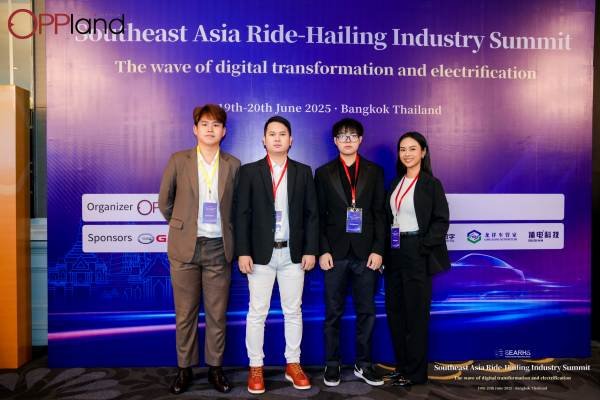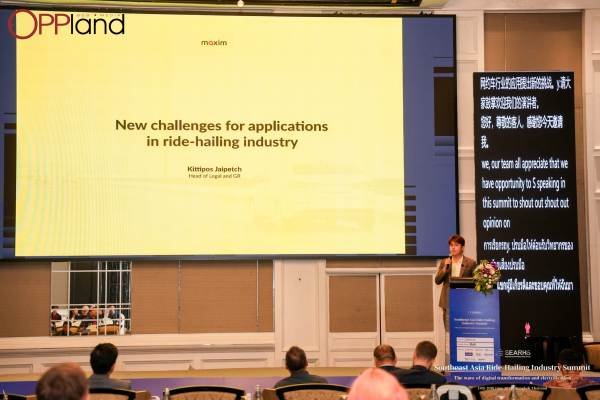Maxim ประเทศไทยหนึ่งในผู้นำหลักของอุตสาหกรรมเรียกรถผ่านแอปฯ (e-hailing) ได้เข้าร่วมการประชุมสุดยอดผู้นำอุตสาหกรรมเรียกรถผ่านแอปพลิเคชันแห่งภูมิภาคเอเชียตะวันออกเฉียงใต้ (Southeast Asia Ride-Hailing Industry Summit) เพื่อพูดคุยในหัวข้อ ความท้าทายที่สำคัญของอุตสาหกรรมเรียกรถผ่านแอปพลิเคชัน (New Challenges for Applications in the Ride-Hailing Industry) ณ โรงแรมเซ็นทาราแกรนด์ ลาดพร้าว กรุงเทพฯ ซึ่งจัดขึ้นโดย Oppland โดยในการประชุมครั้งนี้ ประกอบไปด้วยตัวแทนจากภาครัฐ นักวิจัย ภาคเอกชน และภาคประชาสังคม ได้ร่วมแลกเปลี่ยนมุมมองอย่างกว้างขวาง
Maxim ประเทศไทย ได้เข้าร่วม และแสดงบทบาทในการร่วมขับเคลื่อนการพัฒนาอุตสาหกรรมร่วมกับทุกภาคส่วนในภูมิภาค อาทิ ขั้นตอนการลงทะเบียนและการจดทะเบียนรถยนต์ที่มีต้นทุนและความซับซ้อนสูง ซึ่งรวมถึงค่าใช้จ่ายด้านประกันภัย ค่าธรรมเนียมต่างๆ และข้อกำหนดด้านเอกสารที่อาจเป็นอุปสรรคต่อการเข้าสู่ระบบของคนขับ ส่งผลให้บางส่วนประสบปัญหาความล่าช้า หรือไม่สามารถดำเนินการได้อย่างครบถ้วน
นายกิตติพศ ใจเพ็ชร์ หัวหน้าฝ่ายกฎหมายและรัฐกิจสัมพันธ์ Maxim ประเทศไทย ได้ให้ความเห็นว่า “หนึ่งในประเด็นสำคัญ คือ กระบวนการขึ้นทะเบียนคนขับและรถยนต์ให้เป็นไปตามข้อกำหนดของกฎหมาย ซึ่งยังมีความซับซ้อน และเกี่ยวข้องกับหลายหน่วยงาน รวมถึงมีค่าใช้จ่ายที่สูงสำหรับคนขับ แนวทางหนึ่งที่สามารถนำไปสู่การเปลี่ยนแปลงอย่างเห็นได้ชัดในระยะเวลาอันใกล้ คือ การจัดตั้ง “คณะทำงานร่วม” ระหว่างภาครัฐและภาคเอกชน เพื่อร่วมกันพิจารณาหาทางออกที่สมดุลและสามารถดำเนินการได้จริงภายใต้กรอบของกฎหมาย จะช่วยให้ก่อผลดีด้านความร่วมมือในระยะยาว ปัจจุบัน แพลตฟอร์มได้ดำเนินการประสานงานกับหน่วยงานกำกับดูแลหลักอย่างต่อเนื่อง เช่น สำนักงานพัฒนาธุรกรรมทางอิเล็กทรอนิกส์ (ETDA) และกรมการขนส่งทางบก (DLT) รวมถึงมีแผนขยายความร่วมมือกับหน่วยงานที่มีบทบาทสนับสนุนด้านวิชาการและกฎหมาย จะสามารถให้ข้อเสนอแนะเชิงกฎหมายอันเป็นประโยชน์ต่อการกำหนดแนวนโยบายในอนาคตได้อย่างรอบด้าน”
ทั้งนี้ เพื่อให้การปรับปรุงเชิงโครงสร้างสามารถตอบสนองต่อบริบทการใช้งานจริงได้อย่างมีประสิทธิภาพ การรับฟังเสียงจากผู้ให้บริการในภาคสนามจึงเป็นสิ่งสำคัญควบคู่กับการกำหนดนโยบาย โดยเฉพาะกลุ่มคนขับซึ่งมีบทบาทสำคัญในระบบ และเป็นผู้ที่ได้รับผลกระทบโดยตรงจากข้อกำหนดทางกฎหมาย รวมถึงขั้นตอนต่าง ๆ ที่เกี่ยวข้องกับการใช้งานในแต่ละวัน

เสียงสะท้อนจากภาคสนามของคนขับยังคงชี้ให้เห็นถึงความท้าทายที่เกิดขึ้นในการประกอบอาชีพ โดยมีความเห็นจากคนขับระบุว่า “บริการเรียกรถผ่านแอปพลิเคชันเป็นส่วนหนึ่งของชีวิตประจำวัน และช่วยเสริมสร้างรายได้ให้กับผู้ที่ต้องดูแลครอบครัว อย่างไรก็ตาม กฎหมายและข้อกำหนดในปัจจุบันยังไม่สามารถสะท้อนข้อเท็จจริงของการให้บริการในภาคสนามได้อย่างครบถ้วน ส่งผลให้ผู้ขับขี่หลายรายยังคงเผชิญอุปสรรคในการเข้าสู่ระบบและดำเนินงานอย่างถูกต้อง”
เสียงสะท้อนจากภาคสนามของผู้ใช้แอปพลิเคชันฝั่งคนขับ สะท้อนถึงความท้าทายในการเข้าร่วมระบบ โดยให้ความเห็นว่า “บริการเรียกรถผ่านแอปพลิเคชันได้กลายเป็นส่วนหนึ่งของชีวิตประจำวัน และเป็นอีกทางเลือกหนึ่งที่ช่วยเสริมรายได้สำหรับผู้ที่มีภาระดูแลครอบครัว” อย่างไรก็ตาม ข้อกำหนดบางประการในปัจจุบันยังอาจเป็นอุปสรรคต่อการให้บริการ
นายพงศ์พัฒน์ อักษราวรกานต์ กรรมการผู้จัดการแอปพลิเคชัน Maxim ประเทศไทย กล่าวว่า “อุตสาหกรรม Ride-Hailing กำลังอยู่ในช่วงเปลี่ยนผ่านสำคัญ โดยเราต่างเดินหน้าพัฒนาเพื่อเข้าสู่ระบบนิเวศดิจิทัลที่หลากหลาย ไม่จำกัดแค่บริการเรียกรถ แต่ครอบคลุมถึงด้านสินเชื่อ ระบบชำระเงินอิเล็กทรอนิกส์ ไปจนถึงเทคโนโลยี AI ขณะเดียวกัน Maxim ประเทศไทยยังคงยึดมั่นในความโปร่งใสเรื่องราคา และการให้บริการอย่างทั่วถึงในพื้นที่ โดยการเปิดสำนักงานภูมิภาคเพื่อให้คำปรึกษา และรับฟังความคิดเห็นจากคนขับและผู้ใช้บริการ การประชุมครั้งนี้สะท้อนให้เห็นถึงความพยายามร่วมกันจากทุกภาคส่วน เพื่อผลักดันให้อุตสาหกรรมก้าวต่อไปได้ท่ามกลางข้อจำกัดที่ยังคงเป็นสิ่งที่ท้าทาย”
จากการเข้าร่วมงาน ทาง Maxim ประเทศไทยได้เล็งเห็นว่า อุตสาหกรรมบริการเรียกรถผ่านแอปพลิเคชันยังคงต้องการการสนับสนุนจากทางภาครัฐและภาคเอกชนผ่านการปรับปรุงกฎหมายและระบบการลงทะเบียนให้มีความสะดวก โปร่งใส และเป็นธรรม เพื่อช่วยบรรเทาต้นทุนและความซับซ้อนที่คนขับต้องเผชิญอยู่
นอกจากนี้ เราเชื่อว่าการส่งเสริมมาตรการด้านความปลอดภัย และการนำนวัตกรรมใหม่ๆ มาปรับใช้ให้เกิดประโยชน์สูงสุด จะมีบทบาทสำคัญในการเสริมสร้างความเชื่อมั่นให้แก่ผู้โดยสาร ซึ่งจะนำไปสู่การขยายตัวของตลาดในทิศทางที่ยั่งยืนและเกื้อกูลต่อทุกภาคส่วนในอุตสาหกรรม
Maxim presented “New Challenges for Applications in the Ride-Hailing Industry” at the Ride-Hailing Summit
Maxim Thailand, one of the key leaders in the e-hailing industry, took part in the Southeast Asia Ride-Hailing Industry Summit held at Centara Grand at Central Plaza Ladprao, Bangkok. The event, organized by Oppland, brought together over 250 participants from across the region, including government officials, technology innovators, researchers, and business operators, to discuss the development of ride-hailing platforms as part of driving safer and more sustainable smart cities.
During the summit, Maxim Thailand was invited to present and discuss the topic “New Challenges for Applications in the Ride-Hailing Industry”, sharing insights on the critical challenges facing the ride-hailing market in 2025. Maxim Thailand’s representatives actively contributed to the dialogue and demonstrated their commitment to advancing the industry together with all relevant stakeholders in the region.
One of the core issues discussed was the complexity and high cost of vehicle and driver registration processes, which involve multiple agencies and requirements. Insurance premiums, documentation fees, and administrative burdens have become significant barriers for many drivers, resulting in delays or an inability to complete the registration process.
Mr. Kittipos Jaipetch, Head of Legal and Government Relations at Maxim Thailand, commented: “A major challenge is ensuring that drivers and vehicles are registered in compliance with legal frameworks. The current process remains complicated and financially burdensome, particularly for individual drivers. A constructive solution would be to establish a good relation between government and private sector stakeholders to co-develop regulations that are fair, actionable, and aligned with legal requirements.
We believe that a phased implementation of new rules would allow drivers adequate time to adjust, reduce social tension, and enhance long-term cooperation. Maxim is actively engaging with key regulatory bodies such as the Electronic Transactions Development Agency (ETDA) and the Department of Land Transport (DLT), and seeks to expand collaboration with institutions like TDRI and the Office of the Council of State to support policy innovation and legal interpretation.”
To ensure that structural reforms are responsive to real-world usage contexts, it is essential to listen to voices from the field in parallel with policy development—particularly drivers, who play a key role in the system and are directly affected by legal requirements and daily operational procedures.
Feedback from drivers reflected these concerns, pointing out that ride-hailing applications have become a part of their daily routines and a meaningful source of additional earnings. At the same time, some regulatory frameworks may not yet fully align with practical realities, which could lead to challenges in navigating the system.
Mr. Pongpath Aksaraworakarn, Managing Director of Maxim Thailand, added: “The ride-hailing industry is undergoing a critical transformation, evolving beyond transportation into a broader digital ecosystem—including microfinance, digital payments, AI, and autonomous vehicles. Maxim continues to uphold principles of transparent pricing, nationwide accessibility, and community engagement through our regional offices.
This summit highlighted the shared determination of stakeholders to address existing legal and structural constraints. However, achieving progress needs more than commitment—it is coordinated public-private action. A multi-stakeholder task force will be essential to enabling timely, effective, and balanced regulatory responses.”
Through its participation in the Southeast Asia Ride-Hailing Industry Summit, Maxim Thailand reaffirmed the urgent need for legal reform and simplified registration procedures—solutions that would reduce operational barriers, promote inclusion, and support long-term industry growth.
The company also supports the adoption of new safety technologies, real-time performance monitoring, and accessible communication tools to boost passenger confidence. When combined with collaborative mechanisms such as regulatory sandboxes and open data sharing, these efforts will foster an innovation-friendly environment and help realize the full potential of Thailand’s ride-hailing ecosystem in a way that benefits all stakeholders.





